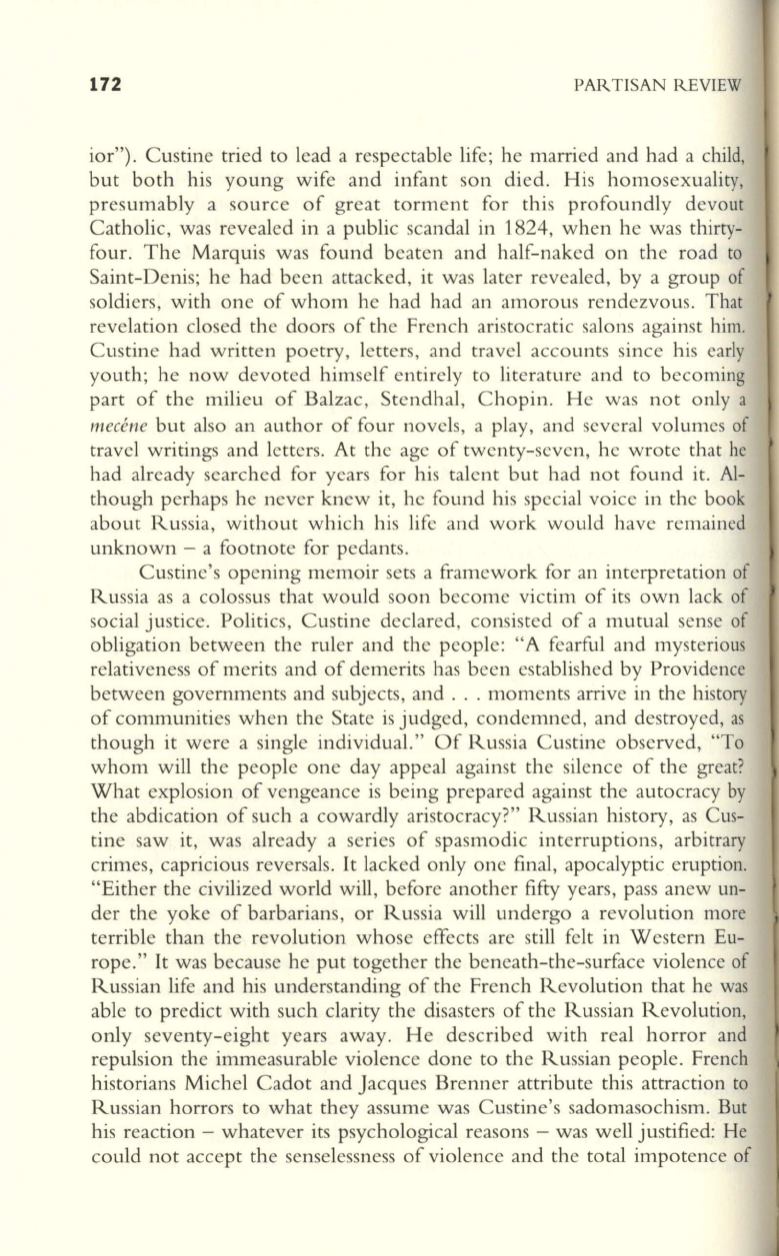
172
PARTISAN REVIEW
ior"). Custine tried to lead a respectable life; he married and had a child,
but both his young wife and infant son died. His homosexuality,
presumably a source of great torment for this profoundly devout
Catholic, was revealed in a public scandal in 1824, when he was thirty–
four. The Marquis was found beaten and half-naked on the road to
Saint-Denis; he had been attacked, it was later revealed, by a group of
soldiers, with one of whom he had had an amorous rendezvous. That
revelation closed the doors of the French aristocratic salons against him.
Custine had written poetry, letters, and travel accounts since his early
youth; he now devoted himself entirely to literature and to becoming
part of the milieu of Balzac, Stendhal, Chopin. He was not only a
mecene
but also an author of four novels, a play, and several volumes of
travel writings and letters. At the age of twenty-seven, he wrote that he
had already searched for years for his talent but had not found it. Al–
though perhaps he never knew it, he found his special voice in the book
about Russia, without which his life and work would have remained
unknown - a footnote for pedants.
Custine's opening memoir sets a framework for an interpretation of
Russia as a colossus that would soon become victim of its own lack of
social justice. Politics, Custine declared, consisted of a mutual sense of
obligation between the ruler and the people: "A fearful and mysterious
relativeness of merits and of demerits has been established by Providence
between governments and subjects, and ... moments arrive in the history
of communities when the State is judged, condemned, and destroyed, as
though it were a single individual." Of Russia Custine observed, "To
whom will the people one day appeal against the silence of the great?
What explosion of vengeance is being prepared against the autocracy by
the abdication of such a cowardly aristocracy?" Russian history, as Cus–
tine saw it, was already a series of spasmodic interruptions, arbitrary
crimes, capricious reversals. It lacked only one final, apocalyptic eruption.
"Either the civilized world will, before another fifty years, pass anew un–
der the yoke of barbarians, or Russia will undergo a revolution more
terrible than the revolution whose effects are still felt in Western Eu–
rope." It was because he put together the beneath-the-surface violence of
Russian life and his understanding of the French Revolution that he was
able to predict with such clarity the disasters of the Russian Revolution,
only seventy-eight years away. He described with real horror and
repulsion the immeasurable violence done to the Russian people. French
historians Michel Cadot and Jacques Brenner attribute this attraction to
Russian horrors to what they assume was Custine's sadomasochism. But
his reaction - whatever its psychological reasons - was well justified: He
could not accept the senselessness of violence and the total impotence of


